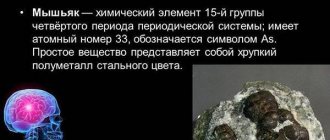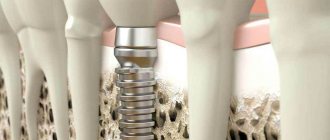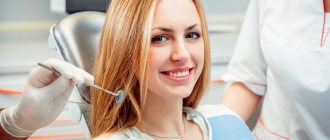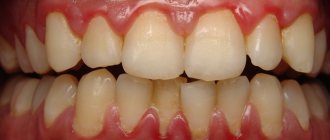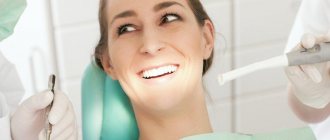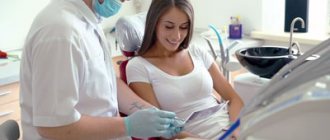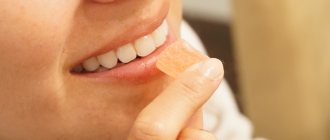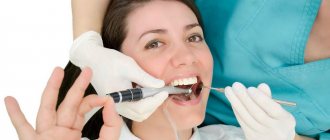Causes of dental problems in young mothers
To understand why teeth hurt, decay or fall out after childbirth, you first need to understand the processes occurring in the female body during pregnancy and lactation. Let's consider the reasons that provoke weakening of the dental system:
- hormonal changes: lead to a decrease in bone density, at the same time, less nutrients are delivered through the blood to tooth enamel and gums. Therefore, they become more fragile and provide less protection against microbial attack and tooth decay/weakening gums during pregnancy and after childbirth,
- changes in the composition of saliva: it also contains less calcium, phosphorus and fluoride than usual - i.e. again the enamel receives less nutrients,
- lack of minerals and vitamins: primarily due to the fact that they “go” into breast milk, which is necessary for the baby. But it could also be that after giving birth, a woman simply does not know what food she should eat so that there are enough “benefits” for both the baby’s milk and her own health. The roots of the problem may also lie in poor nutrition during pregnancy, when the woman suffered from nausea due to so-called toxicosis,
- deterioration of oral hygiene: not always a young mother can find time to comb her hair or drink tea, not to mention high-quality brushing of her teeth. Meanwhile, a bacterial film and soft plaque forms on them, which subsequently transforms into hard deposits (inhabited by harmful bacteria) - and not a single toothbrush can handle it,
- stressful situations and weakened immunity: despite the fact that the birth of a child becomes a very happy event, the daily hassle of care and feeding can undermine moral and physical health. As a result, the body will become less resistant to various infections.
Causes of tooth decay in adults
A trip to the dentist will show what exactly weakened the teeth: one serious illness or a combination of different factors. The most common causes of tooth decay in adults include:
- Heredity.
“Bad” genetics is expressed by:
— in the incorrect structure of the jaw, which causes constant friction of the teeth;
— in the composition of saliva, which does not protect teeth from pathogenic bacteria;
- in a small thickness of enamel.
These features, as well as a predisposition to caries, are inherited. Adults with dental problems need to have their deficiencies corrected in a timely manner. This will reduce the risk of transmitting dental “illnesses” to children.
- Chronic diseases.
Diabetes, various forms of oncology, hypertension, as well as problems associated with the functioning of the thyroid gland, gastrointestinal tract (gastritis, ulcers), etc., weaken the immune system and damage teeth.
- Taking certain medications regularly.
People who regularly use medications and certain drugs (hypnotics, sedatives, antihistamines) should pay special attention to the condition of their teeth. A high concentration of a number of medicinal components increases the level of acidity, changes the composition of saliva, which affects the strength of teeth.
Lack of vitamin D is one of the reasons that weakens enamel
- Avitaminosis.
Vitamins must be supplied to the human body regularly and in sufficient quantities. This primarily concerns vitamins B, C, E and vitamin D.
A deficiency of any component initially affects one’s well-being: rapid fatigue and constant drowsiness occur. Then it is reflected in appearance. Brittle hair, dry skin, cracks in the enamel are clear evidence of a lack of vitamins in the body.
| Groups of vitamins | What does it affect? |
| Vitamin A | The work of the salivary glands, the condition of the periodontal tissue. |
| Vitamin B | Participates in metabolism, affects the growth and development of muscles and tissues. |
| Vitamin C | Prevention of tartar, strengthening of gums. |
| Vitamin PP | Improves amino acid metabolism, prevents inflammatory processes. |
| Vitamin K | Affects the growth and development of tissues and protein function. |
| Vitamin D | Promotes the absorption of fluoride and calcium, increases the strength of bone tissue. |
Improper nutrition leads to vitamin deficiency. You should avoid monotonous food, do not get carried away with flour products, refined grains, and soda. The diet should include solid foods (cheeses, legumes), as well as cottage cheese, kefir, vegetables and herbs.
- Pregnancy and hormonal imbalances.
The development of the fetus and the formation of the baby’s bone structure provokes a deficiency of useful components, primarily calcium. Without it, the enamel will not be strong.
In addition, the following factors lead to tooth decay for the expectant mother:
- stress;
- poor hygiene;
- heredity.
Pregnant women are always recommended to avoid conflict situations, adhere to a balanced diet (vitamins and microelements must be present in the diet), and take walks in the fresh air more often.
Hormonal imbalances that occur due to illness or age-related changes (puberty, menopause) also disrupt the healthy balance of the body. This affects the teeth due to changing acidity levels.
- Bad habits. Bruxism.
Smoking and drinking alcohol slow down metabolic processes. Slow metabolism negatively affects the entire body, and in particular the oral cavity.
Bruxism is the name given to involuntary grinding of teeth, most often occurring during sleep. The habit is determined by the characteristics of the bite and the functioning of the nervous system. It continues, as a rule, until the teeth “ruze” against each other.
The solution in this situation is to wear mouth guards - caps that protect the teeth.
Silicone mouth guards will help prevent involuntary teeth grinding at night
- Injuries.
Tooth decay in an adult is often a consequence of injuries of various types:
— mechanical: bruises or other injuries caused physically, including during treatment;
- chemical, related to the external environment, with the amount of harmful substances contained in it;
— thermal, when there is a sharp transition from cold to hot or vice versa (the most striking example is coffee with ice cream).
- Malocclusion.
Due to a long-standing injury, treatment, or due to developmental characteristics, a person may develop an abnormal bite, in which the load on the teeth increases and they begin to “wear” against each other. This problem is solved comprehensively, with the participation of an orthodontist.
The list of other common causes includes poor quality dental care, natural aging of the body, complex forms of caries and poor ecology.
The habit of chewing nuts or crackers thins the enamel and causes teeth to crumble.
What do women complain about to the dentist after childbirth?
Women often notice a feeling of soreness in their mouth, that their teeth seem to ache, or they have begun to crumble and hurt, old fillings fall out, etc. The main problems that plague a young mother after childbirth are increased sensitivity of teeth, caries, pulpitis, rapid abrasion or destruction of crowns. Problems with the gums manifest themselves in pathologies such as gingivitis, periodontitis and periodontal disease.
On a note! By the way, some mothers’ teeth begin to deteriorate not only after childbirth, but also during pregnancy. But many people don’t do them, putting them off “for later.” As a result, you have to install dentures or completely remove teeth that have crumbled to the roots.
Visit your dentist regularly
Scientists have proven that caries, or when a woman suffers toothache, negatively affects the development of the fetus, so if a tooth hurts during pregnancy, this does not mean that you will have to endure it until childbirth. It is better to turn to professionals for help. An experienced dentist in Minsk will examine the dentition, take into account all the nuances associated with the patient’s pregnancy and, if possible, cure the tooth or at least help cope with the pain, and only then, in the second or third trimester, when this is permitted, will carry out dental treatment .
In general, many patients have probably noticed that every time, before starting dental treatment under anesthesia , the dentist asks if they are pregnant. This is due to the fact that anesthesia is contraindicated for pregnant women, but at the same time, the doctor can select the optimal pain reliever that does not harm the health of the baby and the expectant mother. The specialists of the Center for Family Dentistry provide treatment with high quality, precision and maximum comfort for patients, especially for pregnant women.
Nuances of dental treatment after childbirth - is it possible or not?
Answering the question whether it is possible to treat teeth after childbirth, it is worth saying that during this period all bans on anesthetic injections (which were not recommended during the 3rd trimester of pregnancy) are lifted. However, if the child is breastfed, you will need to express milk in advance for feeding or switch the baby to artificial formula for one day. Also, within 24 hours after the painkiller injection, you will need to express and pour out the milk - and then you can feed the baby as before.
If, after treatment, the dentist prescribed antibiotics - for example, after tooth extraction, treatment of periodontitis or periodontitis, then you should also remember that many drugs pass into breast milk. In this case, you will also need to express and freeze the milk in advance or switch the baby to formula. And in order for lactation to be maintained at the proper level for 5-10 days (while the mother is taking antibiotics), you need to express milk 6-7 times a day, but you cannot give it to the baby.
On a note! It is not recommended to place implants after childbirth for 6-8 months, and implantation should be postponed for another six months after completion of lactation. Since the bone tissue is still quite soft (after pregnancy), the implants may not take root well. The installation of traditional prostheses - crowns or bridges - is discussed individually, because... it all depends on the initial condition of the gums and remaining teeth that may need treatment.
What happens to teeth after childbirth: 10 main questions for the dentist
We selected the most popular questions from nursing mothers and asked the doctor to answer them. After pregnancy, many women begin to have problems with their teeth: caries, inflammation of the gums, loss of fillings. The reason is decreased immunity and lack of calcium in the body after the birth of the baby.
You don’t really want to go to the dentist at this time, especially since it is widely believed that treating teeth during this period is dangerous. In fact, a nursing mother should visit the dentist even more often than usual, because preventing a disease is easier than treating it. Conventional prevention will also help you avoid many dental problems, but it’s worth taking into account some nuances.
We collected the most frequently asked questions from nursing mothers about the treatment and prevention of dental diseases and took them to Volker Grossmann, chief physician of the German Dentistry clinic.
Is it possible to treat teeth for nursing mothers?
Can. Treatment of caries, installation of crowns and tooth extraction are carried out under local anesthesia. Modern anesthetics are absorbed into the blood in minimal quantities, but it still takes 3-6 hours for no trace of them to remain in the body.
Before visiting the doctor, you should make a daily supply of breast milk for your baby. Since after anesthesia, breastfeeding is not recommended for 24 hours. At the same time, it is important not to forget to simply express.
If flux or other inflammations have developed, the dentist will prescribe a course of antibiotics. During this time, you will have to switch your baby to formula feeding and express milk six times a day to maintain lactation.
There are no contraindications for installing implants during feeding, but it is better to postpone this procedure. Your doctor will help you decide on the right time.
Installing braces and correcting the bite creates extra stress on the jaw bones, which are already weakened after childbirth. Therefore, it is better to start treatment with an orthodontist after finishing breastfeeding.
Is it necessary to take calcium after childbirth to strengthen teeth?
Calcium is the number one element for strong teeth. If a person eats well, including foods rich in calcium (cottage cheese, sour cream, cheese, poppy seeds, sesame seeds), then the body receives enough of this mineral.
To maintain health after childbirth, you can take vitamin and mineral supplements for nursing mothers; they will also have a beneficial effect on your teeth.
Can nursing mothers whiten their teeth?
Much depends on the condition of the oral cavity. Some breastfeeding mothers experience increased sensitivity of their teeth and gums, and aggressive whitening pastes can further intensify this process.
After childbirth, it is better to use toothpastes for sensitive teeth. And a few months later, if the teeth and gums are in good condition, try whitening toothpastes.
It is better for nursing mothers to avoid chemical whitening (both at home using a mouth guard and procedures at the dentist). But the procedure for brushing teeth without using Air Flow reagents is suitable.
How to prevent darkening of enamel after childbirth
Brushing your teeth morning and evening, a good toothbrush and toothpaste, rinsing your mouth after meals, and using dental floss will help prevent not only the darkening of your teeth, but also the formation of tartar.
What to do if your gums bleed after brushing your teeth
Modern brushes have soft silicone and polymer bristles that remove plaque well and do not damage tooth enamel and gums. Therefore, after cleaning with a good brush there should not be such a problem. Blood may appear if:
- press too hard on the toothbrush
- your toothbrush is too old (service life - no more than 3 months),
- you have formed tartar (it must be removed by a hygienist),
- you have bad fillings or crowns (overhanging edges, sharp edging cause mechanical damage to soft tissues),
- gums are inflamed (the cause may be mechanical, thermal or chemical injuries).
If all of the above is excluded, and medicinal rinses do not help, you should consult a doctor.
Are fluoride toothpastes good or bad?
Previously, toothpastes with fluoride were widely advertised, but today opinions have appeared in the press that fluoride is harmful. But no evidence has yet been found; science still believes that fluoride is an excellent tool for strengthening teeth.
It's all about quantity. Large dosages of fluoride are bad for teeth, but toothpaste contains little of it.
Today, pastes with fluorides (fluoride compounds) and calcium phosphate are considered the best means for saturating teeth with minerals.
Which toothpastes may be dangerous for nursing mothers?
Read the ingredients of your toothpaste. There are still toothpastes containing parabens on the market. French mammologist Philippa Darbre has proven that parabens cause breast cancer. Since 2014, in France it is prohibited to add them to any hygiene and cosmetic products. But in some countries parabens are still used, for example in Japan.
Japanese toothpastes with parabens are still sold in Russia; they can be dangerous for mother and baby.
Which toothbrush is better - with natural bristles or synthetic bristles?
Even 50 years ago, scientists found out that the brush should only be made of synthetic fibers.
But today everything natural is in fashion, and wooden Sivak sticks, brushes with natural pork bristles, horse hair, mountain goat hair, badger hair, and so on have appeared on sale.
Women after pregnancy and all other people should not use such brushes.
Natural materials have many pores where bacteria linger and multiply, causing inflammatory processes in the mouth. I tend to recommend using synthetic toothbrushes and replacing them every three months.
Which brush is better - regular or electric?
Electric brushes clean your teeth better. But it is very important not to press too hard on the brush, this has a bad effect on your teeth and, more importantly, on your gums. Buy brushes with an indicator that helps you control the pressure. If you press hard on the brush, the red light will light up.
Modern brushes have turned into super-sophisticated gadgets. For example, some models can be connected via Bluetooth to your smartphone, which makes it possible to control the time required to brush your teeth in different modes using motion and pressure sensors.
The brush has several attachments, including ones for sensitive teeth, which will be useful for a nursing mother.
The best way to clean hard-to-reach places in the mouth
Do not clean the space between your teeth with wooden sticks. They break and get stuck, and then you have to go to the doctor to remove the broken piece of toothpick.
Dental floss is the easiest way to clean hard-to-reach places. It is advisable to use it in the evening every day.
Another option is an irrigator. This is a mini dental shower, similar to a dental instrument, from which a stream of water flows under pressure. The irrigator cleans well the space between teeth and old plaque, simplifies the care of crowns and braces, implants and bridges, and also massages the gums.
Source
Professional hygiene – to brighten enamel and protect against bacteria
If a woman during pregnancy or after childbirth notices that her teeth have begun to look darker or yellowed, she begins to think about whitening. But most bleaching compounds containing hydrogen and urea peroxides have a rather aggressive effect on fragile enamel. Therefore, dentists recommend professional oral hygiene, which includes:
- ultrasonic removal of tartar: hard mineral deposits that accumulate near the cervical part cannot be removed even with the most modern brush. But the ultrasonic waves of a special device (scaler) cope perfectly with the problem without damaging natural tissues,
- Air-Flow water-abrasive cleaning: designed primarily to remove soft bacterial plaque, a thin pigmented film that reduces the aesthetics of a smile. Hypoallergenic preparations are used for Air-Flo, so this treatment can be done for children, pregnant women, and women after childbirth,
- polishing the enamel surface with special rollers and pastes: to make the teeth smooth and gain a natural shine. Also, smoothness prevents microbes from “attaching” to the smallest protrusions - this reduces the likelihood of plaque.
Read on the topic: what is professional oral hygiene – and why every person needs it.
By the way, it is recommended to carry out professional cleaning 1-2 times a year, even if the patient is not bothered by any problems in the oral cavity - because this greatly reduces the likelihood of caries. And after professional hygiene, dentists suggest the next step – remineralization. We will tell you why it is needed further.
Implantation methods recommended for women
To summarize, we can derive several rules that will allow for safe and high-quality implant dental restoration in women at different periods of life:
- implantation is not carried out during hormonal changes in the body: during pregnancy, menstruation, as well as for a certain time before and after these periods,
- women are recommended to install implants with a smooth surface (entirely or in the cervical area) and an antimicrobial coating, which will reduce the risk of plaque accumulation,
- the best choice is implants with a hydrophilic surface and a layer of minerals such as phosphorus, calcium or fluorine. Such designs are characterized by better engraftment, especially with osteoporosis (relevant for patients with menopause),
- for edentulous patients, it is recommended to choose implantation methods in which implants are installed in deeper parts of the bone tissue (they are less susceptible to atrophy and inflammation), and the process of their implantation itself is less traumatic.
Expert opinion
Nikolay Vladimirovich Namdakov Maxillofacial surgeon, implantologist, orthopedist Work experience 18+
“Our clinic mainly uses implantation methods with immediate loading, which have significantly fewer contraindications. Naturally, their use is impossible during pregnancy or in case of acute hormonal disorders, however, they are safer in other periods of women’s lives, including those in old age.”
If there are no contraindications, then one-stage implantation will be the best option to solve the problem. If you are planning a pregnancy in the near future, the immediate load on the implant will significantly reduce the treatment time and rehabilitation period.
Read more about immediate loading implantation methods >>>
Remineralization – for strengthening and protection against caries
How to strengthen teeth after childbirth? Of course, you need to eat right - but you don’t have to visit the dentist for this (you can consult a pediatrician, obstetrician-gynecologist, or nutritionist). We will talk about the proper diet after childbirth a little later. As for dental or in-office strengthening, the best option here would be deep fluoridation of teeth, which saturates hard dental tissues with useful substances, making them less sensitive and much more resistant to microbial attack, as well as reducing the risk of caries.
On a note! Remineralization not only makes teeth stronger and more resilient, but also reduces their sensitivity to various irritants - sour or spicy foods, hot and cold. Many patients also note that the remineralization course makes the enamel a little lighter.
Also in dentistry, fluoride varnish is used as a remineralizing therapy - but it wears off quickly, and beneficial substances do not penetrate the enamel. For home use, pharmacy gels for remineralization are prescribed - for example, brands ROCS or Biorepair.
“After giving birth, my teeth began to ache very much from various things - from brushing, rinsing my mouth, hot tea, apples when I ate, and a lot of other things - I don’t remember everything now. I went to the dentist, there was no caries (although I was already worried). The doctor said that you need to use a gel for a month or two to strengthen the enamel; they are sold in any pharmacy. And you know, it helped a lot! Now, even when the child has grown up, I still arrange a course of such strengthening for myself a couple of times a year. And by the way, there are such gels for children, too, but we haven’t tried them yet, first I want to consult a doctor.”
Nastya P., Ryazan, review from baby.ru
Proper Teeth Brushing Technique
Increased sensitivity, as well as excessive abrasion of the enamel, a wedge-shaped defect can appear due to improper brushing of the teeth. The technology of proper oral hygiene includes the following steps and nuances:
- The movements of the toothbrush bristles should be vertical – i.e. You need to move the brush from the gum to the cutting edge: this way food particles and soft plaque will be swept away. Horizontal movements do not sweep away excess from the vestibular and oral surfaces of the dentition, but injure the enamel,
- thorough cleaning of the chewing surface of the lateral areas of the mouth: here you need to move the brush horizontally to clean out food debris from the fissures,
- each segment of the row should be given equal time for cleaning: many clean only the “smile zone”, but at the same time the lateral areas become covered with plaque and tartar, which lead to fissure caries or pulpitis,
- The brush and paste should not injure the enamel and gums: therefore, you need to choose a brush from a trusted manufacturer. Otherwise, you can purchase a tool with sharp fibers cut at different angles and scratch the enamel. The same thing can happen if you use a highly abrasive paste.
Don't forget to change your brush regularly (every 2-3 months) and use medicated toothpastes that are prescribed for gum disease, as recommended by your dentist.
The main reasons for the fragility of dental crowns
What became the root cause of the processes that destroy teeth can only be determined by a dentist. His arsenal includes diagnostic studies and clinical experience, thanks to which it is customary to identify the following factors that cause teeth to crumble:
- Dietary disorders. It is not a myth that excessive consumption of sweets destroys tooth enamel. In a sweet environment, microbes that cause caries multiply with great intensity. Therefore, it is recommended to drink a lot of liquid so that the saliva is not thick, viscous and has a good antibacterial function. The fewer simple carbohydrates in your diet and the more foods containing calcium and vitamin D, the better for your teeth.
- Poor hygiene. It is obvious here that insufficient brushing of teeth and removal of food debris from the oral cavity leads to a massive proliferation of microorganisms that cause caries.
- General condition of the body. Chronic diseases often cause tooth fragility. Most often these are problems in the endocrine system (diabetes). In addition, the natural and completely healthy state of pregnancy can also cause problems with teeth due to metabolic disorders in the body of the expectant mother.
- Anatomical disorders in the structure of teeth and jaw. In case of malocclusion pathologies or violations of the integrity of the dentition, disturbances in the distribution of loads during chewing are observed, which leads to premature wear of the enamel, cracks, and chipped teeth.
- Ecology. Often, the condition of a person’s teeth reflects the quality of the water that he drinks, indicates the presence of high levels of radiation and the content of chemicals in the air.
- Rare visits to the dentist. A specialist will always notice dental problems at an early stage and will not allow a process to start that will destroy the teeth. If you visit the doctor more often, you will have to treat your teeth less often, since regular dental examinations prevent the occurrence of serious pathologies that require long and painful treatment.
Separately, it is worth highlighting wisdom teeth, which already at the beginning of their growth can be fragile due to their unfortunate location, pathological growth and other reasons.
Treatment of gum disease in a nursing mother
Pathology such as gingivitis often occurs during pregnancy and after childbirth. Moreover, bleeding gums must be neutralized so that dangerous bacteria do not penetrate into the general bloodstream. This can negatively affect not only women’s bodies, but also children’s bodies – if the child is breastfed.
If gingivitis is not treated, the inflammation penetrates deep along the tooth root, leading to periodontal inflammation – periodontitis. Which is more difficult to treat and never goes away completely. Another periodontal disease, periodontal disease, begins due to poor nutrition of the tissues around the teeth (gums and bones). If periodontitis and periodontal disease are not treated, the level of the gums decreases, the teeth look longer and begin to become loose, and may even begin to fall out.
Treatment of gum disease is always complex and consists of the following:
- professional oral hygiene: necessary to remove all dangerous microbes,
- removal of subgingival mineral deposits using “Varius” or “Vector” ultrasonic devices: when using these devices, you can do without gum peeling surgery,
- splinting mobile teeth with a special splint,
- curettage of the gums: often accompanied by a surgical operation to peel off the gums, so subsequently you will have to take antibiotics and resolve the issue of feeding the baby,
- applications and injections with medications (for gums): it is necessary to warn the dentist that the patient has an infant - so that the doctor selects a safe medicine,
- plasmolifting of gums: a very effective technique for gum regeneration, the treatment is based on the ability of platelets to restore living tissue,
- selection and use of toothpaste for inflammation and gum restoration: these can be pastes based on plants or medicinal substances, for example, Parodontax,
- using a toothbrush of medium hardness: “medium” is the optimal solution for high-quality cleaning and massage of the gums, because “soft” does not tone the gums at all, while “hard” injures them,
- taking vitamin complexes to improve the condition of the gums: all medications must be agreed with the dentist so as not to harm the baby. Vitamins C and PP are very useful for gums.
Do I need to express milk after anesthesia?
If the medicine used for pain relief is compatible with breastfeeding, then there is no need to express. If the dose of the drug has been increased or the instructions prescribe using it with caution during breastfeeding, then it is better to express the milk after anesthesia. Your doctor can give you advice on this matter, taking into account the type of anesthesia you were given.
So
- Breastfeeding women are afraid to have their teeth treated because, in their opinion, drugs or x-rays may penetrate into the milk. radiation from x-rays.
- In fact, nursing mothers’ teeth must be treated, since infection from diseased teeth will harm the child more than modern medications compatible with breastfeeding.
- In order not to harm the baby when using anesthesia, you need to tell the doctor that you are breastfeeding, and he will select anesthetics that are not contraindicated during breastfeeding.
- After anesthesia, you need to express only if the dose of the drug was increased, if medications containing adrenaline or outdated painkillers were used.
(0 ratings; article rating 0)
Share Share Share
Caries after childbirth - installation of a filling
If after giving birth a woman notices that her tooth hurts, then most likely the cause is caries or pulpitis. What to do in this case? There is no point in postponing treatment, because... Complications may begin. But there are still restrictions, and they are again based on anesthesia, or rather, on the penetration of the drug into breast milk. Therefore, for now, the baby is fed with formula or pre-expressed “frozen”.
On a note! Not all types of tooth decay require anesthesia before treatment. For example, therapy for caries in the “white spot” stage, medium caries, and sometimes the deep stage, is painless and well tolerated without anesthesia.
After childbirth, the patient can have any modern fillings1 - photopolymer, chemical curing, glass ionomer cements. The dentist decides which material is best placed and where – what is more convenient for the doctor to work with, and which material will better demonstrate its qualities in a particular case.
Read on the topic: what kind of fillings are there - TOP 7 materials for filling.
Proper nutrition for nursing mothers
How to preserve a young mother's teeth after childbirth? To do this, you need to eat right - food should be rich in vitamins, minerals and, at the same time, not cause allergies in the baby. Therefore, your daily diet should include fermented milk products (cottage cheese, kefir, hard cheeses), nuts and seeds (for example, sesame, which contains a lot of calcium), lean meat and fish, cereals, fresh seasonal vegetables and fruits, and herbs.
